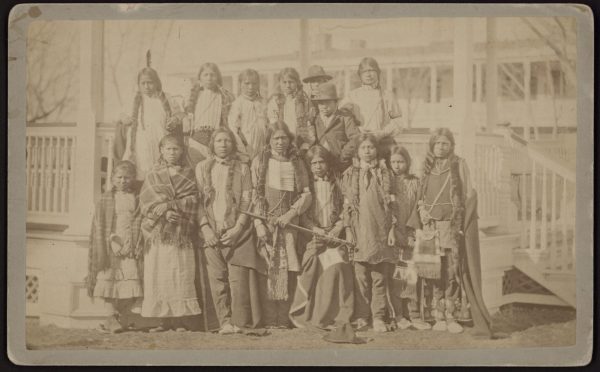Date/Time
Date(s) - October 14, 2021
6:00 pm - 7:30 pm
Categories

The American West Program returns in 2021
After a brief pandemic hiatus in 2020, the Public Lands History Center is thrilled to present the American West Program this fall. In partnership with the Avenir Museum and the Fort Collins Museum of Discovery, the Public Lands History Center is proud to bring Yufna Soldier Wolf to Colorado State University’s campus as this year’s American West Program speaker. A former director of the Northern Arapaho Tribal Historic Preservation Office and the founder of Soldier Wolf Consulting, Yufna Soldier Wolf will share her experience repatriating three Northern Arapaho children from the Carlisle Indian School, the United States’ oldest and largest residential school (1879-1918).
Indian Schools: Part of history, but not the past
The Indian residential school system’s abuses towards children included inadequate food, water, and medical care as well as physical and emotional abuse. Poor treatment created the conditions for epidemic disease. As a result, many children perished at school, far away from their families and communities. Often, school administrators buried children on school grounds rather than returning them to their communities for burial. The consequences of this brutal aspect of the residential school system made headlines in July 2021, when a group from the Tk’emlúps te Secwépemc tribe identified hundreds of unmarked graves at a school in Canada. As Soldier Wolf’s story reminds us, repatriation is an ongoing chapter of history in the United States as well. Together with Northern Arapaho elders, Soldier Wolf negotiated with the U.S. Army to implement the Native American Graves and Repatriation Act (NAGPRA) to bring her tribe’s children home.
Telling untold stories
This event is supported by the Public Lands History Center’s programmatic grant, “Telling Untold Stories of Public Lands,” generously funded by the Henry Luce Foundation. To learn more about the PLHC’s work with Yufna Soldier Wolf and her family, find our recent story in SOURCE.
Join us via Zoom on October 14th from 6:00-7:30 PM.
Meeting ID: 960 8216 7661
Passcode: 869727